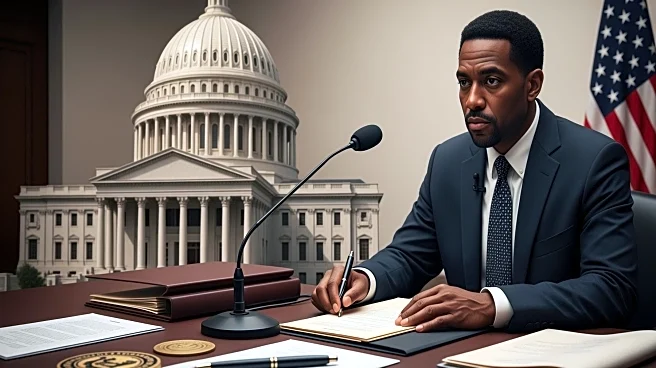What's Happening?
The trial of Sydney Reid, an anti-ICE protester, is underway in Washington, D.C., focusing on the public's distrust of federal officers. Reid was arrested in July for allegedly assaulting an officer while
filming the arrest of a non-citizen. During jury selection, many potential jurors expressed their inability to be impartial due to their negative views of immigration officers. The presiding judge, Sparkle Sooknanan, excused several jurors who admitted their biases. Prosecutors charged Reid with simple assault, claiming she threatened an officer by thrusting her knee upward. Reid's defense argues the movement was reactionary and not intended as an assault. Despite skepticism from potential jurors, a jury was seated, and the trial is expected to conclude by the end of the week.
Why It's Important?
This trial underscores the growing public distrust of federal law enforcement, particularly in relation to immigration enforcement. The case highlights tensions between civil rights and law enforcement practices, with implications for public policy and community relations. The outcome could influence future interactions between protestors and federal officers, potentially affecting how protests are managed and how officers are perceived. The trial also raises questions about the balance between free speech rights and law enforcement duties, impacting legal standards for what constitutes assault during protests.
What's Next?
The trial is set to conclude by the end of the week, with potential implications for how similar cases are handled in the future. Depending on the verdict, there may be reactions from civil rights groups and law enforcement agencies. A conviction could lead to increased scrutiny of federal officers' conduct during protests, while an acquittal might embolden protestors. The case may also prompt discussions on the legal definitions of assault and the rights of individuals filming law enforcement activities.
Beyond the Headlines
The trial could have long-term effects on the relationship between federal law enforcement and communities, particularly those affected by immigration policies. It may influence public perception of ICE and similar agencies, potentially leading to policy changes or reforms. The case also highlights ethical considerations regarding the treatment of protestors and the use of force by officers, which could impact future training and protocols for law enforcement.











